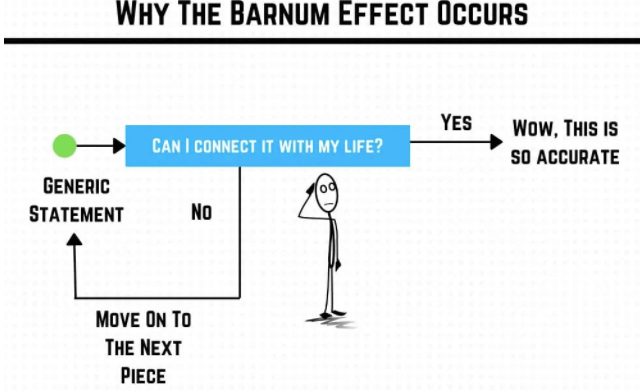The Barnum Effect, also known as the Forer Effect, is a cognitive bias that occurs when individuals believe that vague, general, or overly positive statements about their personality are highly accurate and apply specifically to them. People tend to accept personality assessments and horoscope readings that could apply to almost anyone as if they are tailored to them personally.
Explanations:
The Barnum Effect arises from the desire for self-recognition and the need to find meaning in personality descriptions. People often overlook the general and ambiguous nature of the statements, focusing on the parts that seem to resonate with them.
Examples:
Horoscopes: Many people read horoscopes and interpret them as personally relevant, even when the descriptions are so vague that they could apply to anyone.
Personality Tests: Individuals might take a personality test and believe the results are uniquely accurate, even when the test provides general information.
Psychic Readings: Some people visit psychics or fortune tellers and accept their readings as if they are tailored specifically to them.
Solutions:
Critical Evaluation: Encourage critical evaluation of personality assessments and statements to recognize their generality and ambiguity.
Skepticism: Develop a healthy degree of skepticism when interpreting personality descriptions and assessments.
Awareness of Bias: Be aware of the Barnum Effect and how it can influence one’s perception of personality assessments.
Focus on Evidence: Rely on empirical evidence and concrete observations for a more accurate understanding of personality.
Addressing the Barnum Effect involves recognizing the inclination to interpret general or vague personality statements as highly accurate and actively promoting critical evaluation, skepticism, awareness of the bias, and a focus on empirical evidence for a more realistic understanding of personality.
